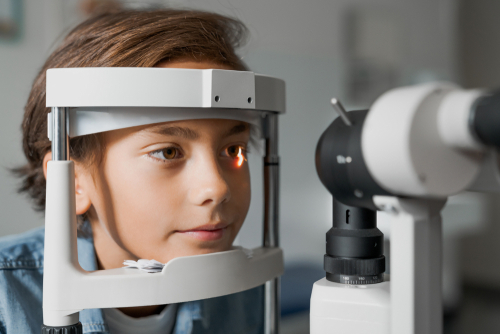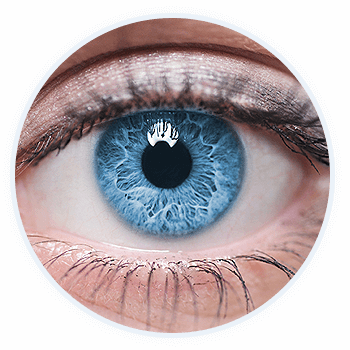
Having a routine eye exam is important to keep your children’s eyes healthy. Healthy vision is important for your child’s overall development and learning ability.
When your child gets regular eye examinations, vision problems can be detected and treated early before compromising long-term vision and eye health.
Keep reading to learn six reasons why children’s eye health exams are important!
1. Avoid Developmental Delays
Poor vision can cause developmental delays, like walking and communication, for example. Children’s eye examinations can identify vision problems like farsightedness, nearsightedness, or astigmatism, all which can be easily addressed with prescription glasses.
If your child has an uncorrected vision problem, it may affect their ability to learn. By getting your child’s vision corrected, they will have an easier time learning new things.
2. Detect Eye Conditions Early
Through eye exams, your children’s eye doctor can catch any eye condition and vision problem early, when treatment is most effective. Timely treatment prevents the progression of eye problems that could impair your little one’s eyesight for life. A child who can see clearly can still have a vision problem relating to eye focusing, eye tracking, and eye coordination. Here are a few eye conditions that are checked during their exam.
Amblyopia, also known as lazy eye, occurs when vision in one eye is reduced because of a communication error between the brain and the affected eye. The sooner amblyopia is treated, the greater chance it will be controlled.
Strabismus, also known as crossed eyes, is a condition that can affect one or both eyes. When a child has strabismus, their eyes do not focus on the same object at the same time. With proper diagnosis and treatment, children can continue on a path of healthy development and clear vision.
Convergence insufficiency is an eye condition that affects how the eyes work together when looking at objects up close, causing blurry or double vision. When caught early, getting vision therapy can help your children’s eyes work together.
Eye and vision problems tend to worsen with time. So, timely detection and treatment are critical in protecting your child’s vision and eye health.
3. Ensure Your Child Has Healthy Eyes
Many vision problems begin at an early age and it’s common for children to be unaware of any issues with their vision. Just because your little one has never complained about their eyesight doesn’t necessarily mean they can see clearly. And even if they truly have great vision, it doesn’t necessarily mean their eyes are healthy.
When your child gets regular eye exams, their eye doctor can follow their vision and eye health at every stage of development. If anything changes, their doctor will be able to treat and manage your child’s eye condition as early as possible.
To make sure your child’s eyes are developing correctly, regular eye exams are crucial.
4. Monitor Your Child’s Vision and Eye Health
As your child grows, their eyes can quickly change. Children are still developing, and so is their eyesight. For this reason, your child’s vision quality may change from year to year without warning. A child’s eyesight can change at any time, often unrealized by you or your child.
That’s why routine eye exams are crucial. Eye examinations will help you keep tabs on your child’s vision and eye health.
If your child is experiencing new symptoms, such as blurry vision or headaches, they may need glasses.
5. Boost Your Child’s Academic Performance
About eighty percent of learning is visual for kids. So, clear vision is especially essential for school-age children.
Your child will need clear vision for writing, reading, playing with others, and other activities when in school. If your child has an undiagnosed eye condition or refractive error, they’re more likely to fall behind in school.
Illinois requires all children have an eye examination from an eye doctor before entering school. Comprehensive eye exams are recommended for children at ages three and five. Annual eye exams are recommended for kids ages six through eighteen, the time when their eyes are growing the fastest.
Frequent eye examinations can help your child realize their full potential at school. Your children’s eye doctor will thoroughly check their eyes and recommend the best steps to ensure your young one’s healthy vision and eyes.
6. Improve Safety
When kids play outside, being able to clearly see traffic lights, road signs, and vehicles is critical to their safety. With the aid of eye examinations, vision problems will be identified and treated to improve your child’s eyesight.
Our doctors recommend kids spend at least two hours a day doing outdoor activities. Research suggests that spending time outside can slow the progression of myopia (nearsightedness) which typically develops during childhood.
With that in mind, always remember to protect your children’s eyes with 100% UVA/UVB protected sunglasses, even on cloudy days. If your child wears glasses, talk to your child’s eye doctor and optician about transition lenses to ensure their eyes are always protected from the sun’s harmful rays.
Protect Your Child’s Vision with Regular Eye Exams
Eye health exams for children at VisionPoint Eye Center are the best way to maintain your child’s eye and vision health.
Is it time for your child to have an eye exam? Schedule an appointment at VisionPoint Eye Center in Bloomington, IL, today!









